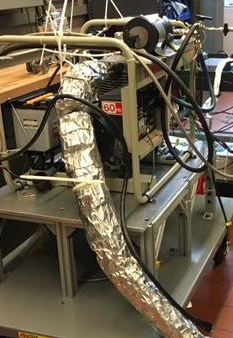Intelligent Power Systems
Annual PlanBulk Modulus of Compressibility Measurements of Conventional and Alternative Military Fuels
Project Team
Government
Eric Sattler, U.S. Army TARDEC
Industry
James Anderson, Ford Motor Company
Student
Taemin Kim, University of Michigan
Project Summary
Project began in 2014 and was completed by 2017.

Diesel fuel injection systems that rely on the application of hydraulic pressure to the fuel to open a needle that allows fuel to be injected into the engine can be sensitive to the hydraulic properties of the fuel being injected. Two properties of relevance are viscosity and compressibility, which is typically measured and reported in term of the bulk modulus of compressibility. Variations in the bulk modulus of compressibility away from values typical of diesel fuels (or conventional hydrocarbon fuels) can significantly influence the injection timing and combustion behavior of diesel engines when operating on such fuels, leading to changes in engine emissions, and potentially to changes in performance, fuel economy and driveability.
The research objectives of this project were to provide measurements of the compressibility of conventional and alternative diesel and jet fuels of interest to the U.S Army and to serve as an additional, experienced partner with whom to compare compressibility measurements of conventional and alternative military fuels. The outcomes provided additional means to understand the implications of moving from conventional to alternative sources of fuel and the fitness for purpose of these fuels in the engine systems used by the U.S. Army.
In addition, comparisons were made between JP-8 surrogate fuels being developed by Automotive Research Center researchers (projects 4.6, 4.17, 4.19) and the practical fuels that the surrogates were intended to represent, to ascertain how well the surrogate fuels represent the compressibility of JP-8. While the bulk modulus of compressibility of the surrogate was not one of the properties the surrogate is intended to match, this comparison between JP-8 fuels and the JP-8 surrogate provided information that helped to anticipate injection timing shifts in subsequent engine testing of the surrogate, if an engine with a pump-line-nozzle injection system was used for such comparisons.
Publication:
- Kim, Taemin, Dongil Kang, and Andre Boehman. “Compressed liquid density and the bulk modulus of conventional jet fuels and jet fuel surrogates.” ABSTRACTS OF PAPERS OF THE AMERICAN CHEMICAL SOCIETY. Vol. 250. 1155 16TH ST, NW, WASHINGTON, DC 20036 USA: AMER CHEMICAL SOC, 2015.

